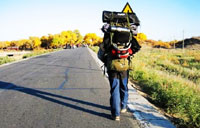Travelers warm up to online guides
Updated: 2014-10-22 09:22
By Xing Yi(China Daily)
|
|||||||||||
Printed guides from professional writers and editors might have been the go-to choice for tourists in the past, but crowdsourced electronic guides, powered by the imagination of thousands of avid travelers, are changing all that.
Different from traditional guidebooks, the e-books are compiled and updated based on tons of information shared by individual travelers online. They can be downloaded onto tablets and cellphones, and most are free.
Mafengwo.cn, a popular Chinese crowdsourced website, reports that its travel guides were downloaded more than 220 million times.
Most of the content is user-generated, such as pictures, travelogues and comments, from which valuable information is identified through data mining and semantic analysis, says Chen Gang, the co-founder of Mafengwo. "We have a set of algorithms to select what will be put into our travel guides."
|
|
The website started as a humble forum, where backpackers and travel buffs shared their experiences. Chen and his friend Lyu Gang, both frequent travelers, founded it in 2006.
"We found that the printed guidebooks were not updated, while travel information online is scattered and unsystematic," says Chen. "So we wanted to build a place where travelers could share their information firsthand."
In the first four years, the forum got more and more people to chip in with their travelogues, reviews of tourist attractions and personal stories of their journeys.
Gradually, the forum grew into a noticeable online community of travelers through word-of-mouth publicity, and Chen and Lyu turned it from a part-time project into a company in 2011.
Today, the website claims to have around 50 million registered users, with 2 million active users contributing more than 100,000 pieces of travel information daily.
Qyer.com is a similar Chinese website that's popular with travelers. But it focuses solely on providing electronic guides to Chinese tourists traveling abroad. It combines the traditional method of hiring some professional travel writers to author its guides and having users of the website update the information regularly.
"If a travel guide isn't updated in a timely fashion, it's worth nothing," says Zhang Yi, the director of operations at Qyer. "We have more than 200 travel guides of overseas destinations that our website users update every day."
Zhang says that they have four editors who verify the updates submitted by users. But he plans to devolve the verification process to the online community in the future, when users are able to cross-examine information so that it becomes a self-sufficient system.
Given the increasing popularity of mobile devices and networks, the electronic guidebook is evolving quickly. Both Mafengwo and Qyer have already developed several travel guide apps, which allow travelers to interact and share information more conveniently over the phone.
"It's just that printed guide books are past their time," says Zhang.
Today's Top News
Premier Li behind row settlement with EU
UK issues milestone RMB bonds
Chinese community leaders in London blast HK protests
Manchester investment portfolio launches in Beijing
Hebei to lower emissions during APEC conference
Step up the battle against HIV/AIDS, urges first lady
PBOC official gets ready 'to assume helm' at ABC
Russian FM sees long standoff with US
Hot Topics
Lunar probe , China growth forecasts, Emission rules get tougher, China seen through 'colored lens', International board,
Editor's Picks

|

|

|

|

|

|






